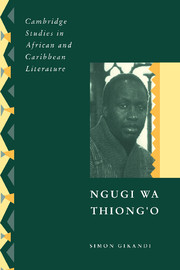Book contents
- Frontmatter
- Contents
- Preface
- Chronology
- 1 Introduction: reading texts and contexts
- 2 Narrative and nationalist desire: early short stories and The River Between
- 3 Educating colonial subjects: the “emergency stories” and Weep Not, Child
- 4 Representing decolonization: A Grain of Wheat
- 5 The poetics of cultural production: the later short stories and Petals of Blood
- 6 Performance and power: the plays
- 7 The prisonhouse of culture: Detained and Devil on the Cross
- 8 The work of art in exile: Matigari
- 9 Writing freedom: essays and criticism
- Conclusion
- Notes
- Bibliography
- Index
1 - Introduction: reading texts and contexts
Published online by Cambridge University Press: 09 February 2010
- Frontmatter
- Contents
- Preface
- Chronology
- 1 Introduction: reading texts and contexts
- 2 Narrative and nationalist desire: early short stories and The River Between
- 3 Educating colonial subjects: the “emergency stories” and Weep Not, Child
- 4 Representing decolonization: A Grain of Wheat
- 5 The poetics of cultural production: the later short stories and Petals of Blood
- 6 Performance and power: the plays
- 7 The prisonhouse of culture: Detained and Devil on the Cross
- 8 The work of art in exile: Matigari
- 9 Writing freedom: essays and criticism
- Conclusion
- Notes
- Bibliography
- Index
Summary
Several paths are open to the reader who wants to examine Ngugi's literary and critical works in their historical and cultural context: one can choose, for example, to read them as specific commentaries on the African experience as it emerges from colonial domination and moves into the theatre of independence and postcoloniality. One could read these works from the ideological perspective provided by the author himself through his essays and social commentaries. Or one could choose to analyze Ngugi's major novels as a series of experiments in narrative form, experiments driven by the author's search for an appropriate style for representing an increasingly complex social formation. Whatever approach the reader prefers, however, several questions and problems immediately come to mind: what is the relationship between Ngugi's texts and their contexts? Indeed, what is Ngugi's immediate context? Are his novels and plays to be read as attempts to come to terms with a Gikuyu culture trying to reinvent itself in face of the problems and opportunities provided by British colonialism as it establishes its hegemony over the peoples of Central Kenya? Or are these narratives to be read as part of a larger project trying to will an independent Kenyan nation into being?
Reading Ngugi's works through his ideological pronouncements may be convenient to some readers and critics, but it is a process that presents its own theoretical problems: how do we respect his strong views on the nature of literary production, the function of culture, and the relation between art and politics without repressing the significant contradictions that are equally important to the shape and function of his novels and plays?
- Type
- Chapter
- Information
- Ngugi wa Thiong'o , pp. 1 - 38Publisher: Cambridge University PressPrint publication year: 2000

